- Home
- Jacob Peppers
A Sellsword's Valor Page 18
A Sellsword's Valor Read online
Page 18
The big man waved a hand dismissively. “Nothin’ worth concernin’ yourself over. Just more rumors in a sea of them—I wouldn’t waste your time tellin’ you about things that are just as likely the visions of men too drunk or high to see their hands in front of their face.”
Aaron sighed. “I think you’d probably better.”
“Fine,” the tavern keeper said, “but I warned you.” He hesitated as if unsure of how to begin. “Alright,” he said finally, “well, it’s like this—and I ain’t sayin’ I agree with any of it, mind. But ownin’ a tavern, well, you get some interestin’ folks walking through the doors; I can tell you that much. Folks as come in lookin’ like murder’s on their mind, and they’re lookin’ to do some right then, folks that treat the tavern like it’s a sanctuary to save them from the night—which it is, I suppose to some of the poor bastards.
“Shit, you get women come in on account of they found out their husband’s been cheatin’ on them, or men come in because of their wives doin’ the same. All kind of folks, really, but not too many normal ones, if there even is such a thing. In my experience, folks that frequent taverns, downin’ ales like they got somethin’ inside ‘em they’re tryin’ to drown…well, they generally do. Still, I got to be honest as long as I been in this business, I’m startin’ to think there ain’t no normal, just different degrees of fucked up is all. I tell ya, I had a fella come in here the other day—”
“What about the people?” Aaron interrupted, feeling that he was getting close to understanding something, but he wasn’t even sure what that something was.
The tavern keeper started. “Oh, right. Sorry about that one, Aaron. The older I get, the more often it seems that my mind tries to run away with me. Anyhow, what I’m tryin’ to say is that a tavern gets all kinds: killers, thieves, whores, merchants down on their luck, farmers who’ve lost their crop to the weather. All kinds and all different. But all of these got one thing in common—they like to drink, and most like to drink a lot. And the thing about drunks is they like to talk. Put a man beside ‘em, that man’ll know their life’s story in half an hour. Shit, most of ‘em, I’m pretty sure you could stick ‘em in a room by their self and before the night was over the walls’d know enough about ‘em to write their life’s story, if’n they had the hands to write it with.”
Aaron forced himself to remain calm and keep his patience, but the tavern keeper had a way of saying a lot without really saying much at all—a thing he thought he’d grown accustomed to after having spent so much time with the Parnen. “What have they said?”
“Well, lots of things,” Nathan said, and Aaron could have shook the man, “normally, men and women like that got a thousand stories to tell you, each one more unlikely than the last, if you’ll stay there and listen. But lately…” He shook his head. “Gods, but I feel like a fool even sayin’ it. Lately, the stories have been a lot darker than normal, and even I have to admit there’s been some strange similarities in what they’re sayin’. It’s a funny thing, bein’ an innkeeper. I reckon folks’ll tell things to the man brings ‘em a beer they wouldn’t even think of tellin’ to a priest or their wives. Anyhow,” he said, apparently noting Aaron’s impatient expression, “these ones been talkin’ about figures in hooded cloaks. Some…shit on it, some are sayin’ there’s men up under them cloaks that are as much bigger than me as I am to Leomin here.”
The Parnen sniffed at that. “A greater size, friend Nathan, only means that one takes up more space and, therefore, has more responsibility to justify said space.”
Aaron waved his hand sharply. “Never mind that. What else?”
“Well,” the tavern keeper said, his bushy eyebrows drawing down in thought, “I’ve heard some stories as say these fellas are bigger’n they have any right to be, bigger than a man can be. Eight, nine feet tall—shit, I’ve heard some say as tall as fourteen feet, but that fella was pretty deep in his cups, and I don’t put much stock in it. One regular of mine even went so far as to say he was walkin’ down the street over where all the blacksmiths work—Bertrand is a jeweler, but from what I understand, he ain’t a very good one.
“Anyhow, he said he was walkin’ by and he saw one of those fellas accompanied by a smaller man, an officious lookin’ sort, the kind that’d scold you for spittin’ on the ground then charge you for him to clean it up, you know? Thing is, Bertrand said that he saw ol’ Odel the blacksmith talkin’ to the two, lettin’ em inside his shop but not like he wanted them there, you know? More like it was a chore he wanted to get over just as soon as he could.”
He shook his head. “I’ll tell ya, fellas, if you think I’m big, you ought to see Odel. That man’s a monster and a half, and one I’d go out of my way not to cross. Used to have quite a reputation back in his day too, as the best street fighter Baresh has ever seen. Now, what was it they used to call him,” he said, rubbing his thick chin in thought, “Steel Fist or Boulder hands. Some dumb shit like that, but I’ll tell you, it wasn’t as dumb as the folks he took issue with. The ones that lived don’t say nothin’ much anymore. Don’t do a lot of thinkin’ either, from what I gather. Bertrand said he was goin’ on about his way, and he thought he heard shouts from the inside of the shop. Bertrand’s a nervous man at the best of times, and this had him real shaken up. The bastard was cryin’ when he told me, which I wouldn’t think much of as lots of men cry when they’re drunk, but Bertrand’s never been one of them, not in my knowin’.”
He laughed a loud, hearty laugh. “He told me it sounded like men were goin’ to war in that shop, and he did the only thing he could think of—dove into a passing cart. Well, turned out the cart was full of chickens and by the time Bert felt safe enough to climb out, I guess those chickens had shit just about all over him. But before all of that, as the cart was drivin’ away, Bertrand said he saw the big fella in the cloak and the small man come back out. Odel was with ‘em too, only he wasn’t walking. To hear Bert tell it, the big fella had Odel thrown over one shoulder like he didn’t weigh no more than a sack of potatoes.”
He grunted. “Crazy, of course. Odel is a good fella and a great blacksmith, but that bastard has to weigh damn near half again more than me, and I’m no small guy. I don’t care how strong you are—there ain’t a man in this world that could tote Odel over his shoulder and not show the strain of it, but that’s exactly what Bert said he did. He said he got a look at the blacksmith’s face, too, and it was all bloody and banged up like he’d been in a fight and got the worse part of the deal. He said he watched ‘em walk down an alley and out of sight as if they didn’t have a care in the world. Apparently, they didn’t notice Bert and probably that’s just as well. Bertrand is a talker, but I like him well enough. If even half of what he said is true, I’d hate to see him get mixed up in it.”
Aaron met Leomin’s eyes and saw his own troubled thoughts reflected in the Parnen’s gaze. He turned back to Nathan. “Is that all of it?”
“Most of it, anyhow. I’ve heard a few more stories—folks as say they’ve seen kids runnin’ around in cloaks, only the kids have arms that reach all the way down to their feet or damn near it.” He shrugged. “Ridiculous, of course, but then people’ll say just about anythin’ comes to mind when they’re deep enough in their drink.”
Aaron frowned, his thoughts racing. Kevlane. It has to be.
Aaron, Co said, and he started at the sound of her voice in his head after she’d been silent for the entire conversation, surely, you don’t think that Kevlane…what? Started up his experiments again? My father told him to never do such things again, and he promised.
Yeah, Aaron thought, well, I don’t know, firefly, not for sure. But what I do know is that three thousand years is a long time to keep a promise to a man that’s been dead for just as long. And I think it’s safe to say that Boyce Kevlane isn’t the same man he was when your father was alive.
“This Bertrand,” Aaron said aloud to the barkeep, “you said he’s a regular?”
“That’s ri
ght.” He frowned. “Though, now I think of it, it’s been a while since I’ve seen Bert. Normally I guess he’s here just about every night, but I haven’t seen him in a few weeks now.” He looked at Aaron. “You don’t think…”
“I don’t know,” Aaron said, “but I think it’d be best if we check on him. Besides, I’ve got some questions I’d like to ask him. Do you know where he lives?”
“Sure,” Nathan said, “Bert’s got a place over in the merchant’s district. Nice one it is, too. Still, do you think it’s that important?”
“We won’t know until we talk to him,” Aaron said, meeting Leomin’s eyes, “but yeah. Yeah, I think it is.”
Nathan nodded. “Alright then,” he said rising, “I’ll show you where it’s at.”
“You won’t find him there.”
They all spun at the sound of the voice to see a cloaked figure standing inside the tavern’s entrance, his hood obscuring his features.
Cloaked figures in the night, Aaron thought, remembering the innkeeper’s words. He rose out of his chair, drawing his sword. “Who are you?”
“No one of any importance, sir,” the cloaked figure said, “but you can put the sword away—I mean none of you any harm. Besides, judging by your stance and attitude, I calculate no more than a one in five chance that you’ll attack me unprovoked.”
Aaron laughed, but there was no humor in it. “I’m a sellsword, stranger. I’ve been in plenty of spots with a much less than one in five chance of surviving, but I’ve still come out the other side breathing.”
The figure shrugged. “Then your math was wrong.”
The big bartender grunted, taking a step toward the figure. “You the fella that was knockin’ on the door?”
“I thought it best to be polite.”
Nathan frowned at that, seemingly unsure of what to say. “Well…that is, we’re closed. Why don’t you come on back another time, friend? This ain’t a group of men you want to fool around with, believe you me.”
“Actually,” the figure said, “this is exactly the group of men that I’ve been looking for. If, that is, you are looking into the disappearances in the city and the, for lack of a better term, ‘figures’ that are believed to have been seen prowling the streets.”
Aaron frowned and reached out with his bond toward the stranger, trying to get some hint what he wanted. Had the figure been sent by Belgarin or, perhaps, Boyce Kevlane? Were they being surrounded, even now, while they listened to him? He reached further for the bond, drawing more on its power. At first, he picked up a snatch of emotions—fear chief among them—but suddenly, for the first time, he was rebuffed completely. It was as if a thousand-foot-high wall had suddenly appeared, blocking the path of whatever sense he used to quest into another’s thoughts, a wall of flawless, pristine white, and he grunted in surprise, jarred by the abruptness of it. “You heard the man,” he said, rubbing at a sharp pain in his temple. “The tavern’s closed. Now, if you’ve nothing else—”
Suddenly, a blue orb blossomed to life in front of the cloaked figure and though Aaron had not seen this one before, he knew well enough what it was, and his eyes widened in surprise.
“Just how closed are you?” the cloaked figure asked, and if the fear Aaron had felt in the stranger was real, he did not hear it in his voice. “Forgive me,” he said, bowing slightly to Aaron, “but as you perhaps know, the Seven act as guards against each other to a degree, and I thought it better that we got to know each other the old-fashioned way.”
The figure threw back his hood, and the barkeep grunted. “A child.” Aaron noted that the big man was right. The stranger appeared to be a young boy of no more than thirteen or fourteen years, but there was a sharpness, an intelligence in his eyes that was impossible to miss, one that spoke of someone far older and more experienced.
“I am, as you say, a child,” the boy said, nodding his head to Nathan, “at least by the reckoning of our current culture.”
“Child or not,” Aaron said, staring at the floating blue orb and then back to the boy’s face, “you’re still here uninvited. How did you get in, anyway?”
The youth shrugged. “I used to…work at a tavern myself,” he said, glancing around, “though, I hope you don’t think it empty flattery when I say it was nowhere near as fine as this one. Alder, the tavern’s owner, was a cruel master, yet even in such a state as I was in, I had the opportunity to learn much from those around me, though I did not know it at the time. You see, men rarely guard their tongues when they are in their drink, and even less around a dimwitted boy who is barely capable of coherent speech. One such man was a thief, and while I cleaned up an ale one of his friends had spilled, he busily recounted his most recent night’s take, and the methods he’d used to gain entry into the house which he robbed. That was…four years ago, if I’m not mistaken.”
Nathan snorted. “Well, you’re right about men in their drink guarding their tongues, at any rate. But do you mean to tell me that you learned how to pick a lock from half listenin’ to some thief four years ago? That would have made you, what? Eight, nine years old yourself?”
“Nine, actually,” the youth agreed, “but I won’t pretend that I learned it at the time—the man was quite drunk and despite his friends’ questions, gave only a vague idea of how he had gained entry. Still, the knowledge stayed with me, and I was able to use it as a starting point to derive the best means of picking the lock to your fine tavern.”
“The knowledge stayed with you,” Aaron said flatly.
“Indeed,” the youth said, smiling slightly, “as it almost always does. People, I find, often see and hear more than they realize at the time. But those facts, those experiences, stay with them for years, buried beneath thoughts of today and tomorrow, of how best to woo a woman or to get richer. Knowledge, then, true knowledge, is only knowing the location of things half-remembered, of taking a shovel, as it were, and digging them up and bringing them out into the light. It is knowing that they are buried in the first place.”
“I don’t know about all that, lad,” Wendell said, rising and coming to stand beside Aaron, glancing suspiciously at the blue orb before looking back at the boy, “my ma used to tell me I didn’t have enough sense to get out of the rain, and I reckon she was right. My question, though, is just who exactly you are, and why you felt the need to come here in the first place?”
“As for who I am…” The youth hesitated, glancing at Aaron. “I must first tell you who I was. Not long ago—weeks, no more than that—I was much like the girl who you saved in the tavern tonight.”
Wendell glanced sourly at Aaron. “A girl. I should have known.”
The youth smiled and, for a moment, the ancient light seemed to leave his eyes, and he was only a child. “I mean no disrespect to you sir,” he said to Aaron, “in fact, quite the opposite. You see, I spent years as a slow-witted servant to Alder. I spent many nights getting ale dumped on my head or beaten when Alder had a mind to, and not in all that time did I ever see anyone stand up for me the way you stood up for that girl.”
Aaron grunted, suddenly embarrassed. “Couldn’t enjoy my beer with all that hollering, that’s all. And anyway, that still doesn’t explain why you felt the need to break in.”
“Yes,” the boy said, “well, enough to say I was at the tavern on my own business, with my own intentions. I had, in fact, been considering some sort of revenge—nothing serious, understand. But it had seemed to me then that I would have liked to have revisited some bit of the pain Alder and many of his regulars caused me over the years onto them. Strange, though, as the urge came upon me quite abruptly. Or, perhaps,” he said, smiling, “not so strange. For it is true, is it not, that the Seven are attracted to one another, as if always seeking to become the One for which they were meant to be in Caltriss’s time?”
“Alright just hold on a damned minute,” Nathan demanded, pointing at the blue orb warily as if he thought it might attack him at any moment. “Just what in the fuck is that?”
<
br /> “That,” came what sounded like the wizened voice of an old man, “dear barkeep, is Palendesh. Or, at least, I was. Now, I am less—and more—than the man I once was. I am one of the Seven, beings forged…well, I’m sure you’ve heard the stories.”
Palendesh? Co said into his mind. Can it truly be…?
Aaron felt the Virtue’s yearning. Wait, firefly. Look, we don’t know anything about this kid. For all we know—But the Virtue was already moving and, in a moment, she appeared in front of Aaron, a bright, shining orb of magenta. “Palendesh,” she said, “is it truly you?”
Nathan and Wendell both gave out shouts of surprise, stumbling away.
“It is I, Evelyn,” the blue orb responded in a voice that sounded to Aaron like a kind grandfather speaking to his favorite granddaughter, “and it seems that the gods are not always cruel, for I hoped it was you.”
“It has been so long,” Co said, hovering closer to the orb until they were only inches apart.
“So it has, my dear,” Palendesh responded, “too long. Tell me, how—”
Suddenly, Leomin’s own Virtue appeared, hovering in front of him with a shout of girlish glee, and the yellow orb rushed across the room to float near with the other two. “Palendesh!”
“Ah, Aliandra,” the blue orb said in an amused voice, “it is good to see you as well.”
Aaron turned to the Parnen, who only shrugged, sighing. “Alright,” Nathan said in a near whisper as he stared wide-eyed at the three Virtues, “somebody needs to explain just what in the name of the Fields is going on here.”
“Co, why don’t you and your friends run off somewhere and catch up.” Aaron glanced at the other men gathered in the room, including the youth. “We’ve got some things to discuss ourselves.”
In another moment the Virtues were gone, and Aaron and the others were once more seated at the table, Nathan with a worried, slightly crazed expression, and Wendell pouring ale down his throat as if there was a fire somewhere in his stomach he was looking to put out.

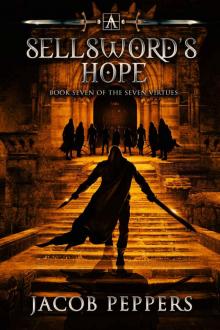 A Sellsword's Hope
A Sellsword's Hope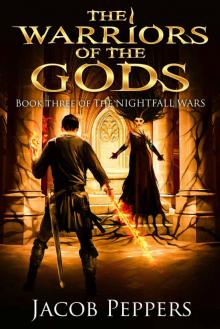 The Warriors of the Gods
The Warriors of the Gods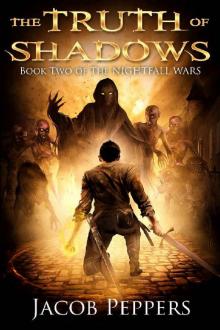 The Truth of Shadows
The Truth of Shadows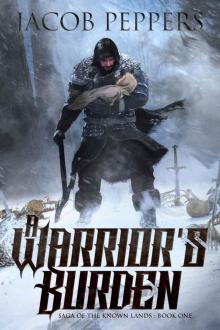 A Warrior's Burden: Book One of Saga of the Known Lands
A Warrior's Burden: Book One of Saga of the Known Lands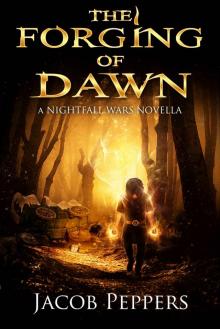 The Forging of Dawn
The Forging of Dawn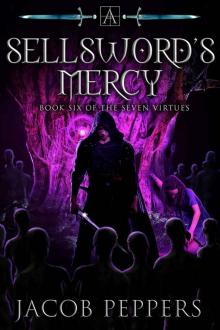 A Sellsword's Mercy
A Sellsword's Mercy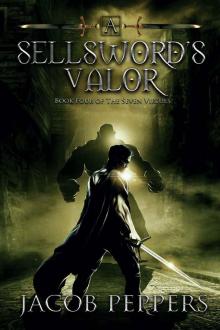 A Sellsword's Valor
A Sellsword's Valor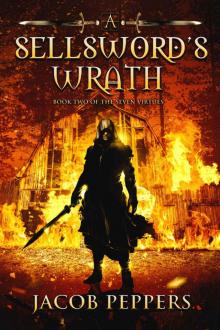 A Sellsword's Wrath
A Sellsword's Wrath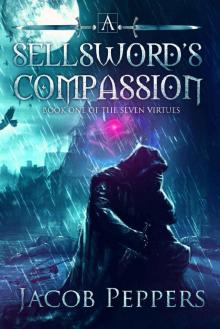 A Sellsword's Compassion_Book One of the Seven Virtues
A Sellsword's Compassion_Book One of the Seven Virtues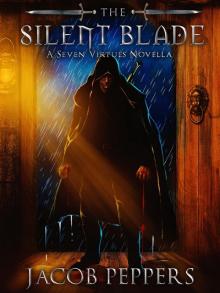 The Silent Blade: A Seven Virtues Novella
The Silent Blade: A Seven Virtues Novella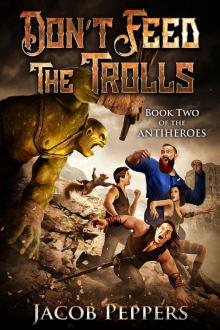 Don't Feed the Trolls
Don't Feed the Trolls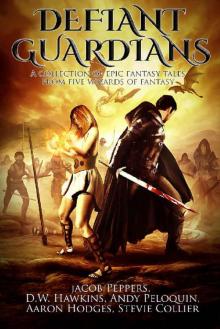 Defiant Guardians Anthology
Defiant Guardians Anthology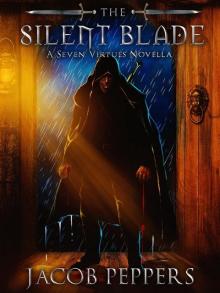 The Silent Blade
The Silent Blade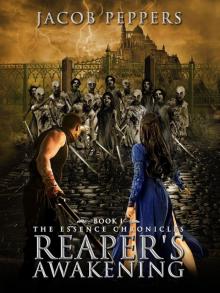 Reaper's Awakening
Reaper's Awakening